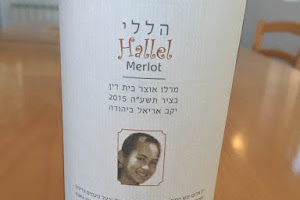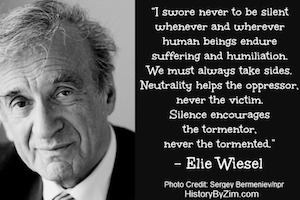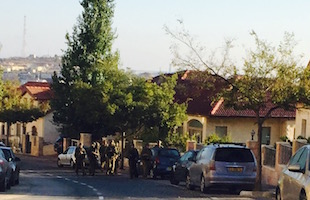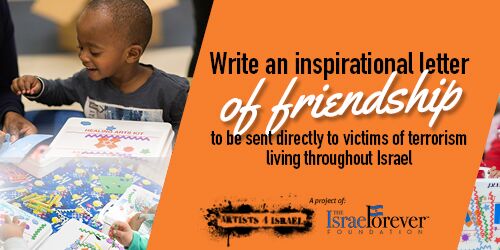When Boarding A Bus Gets Political
by Sheri Oz
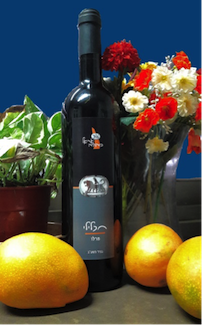
Wine from Ariel B'Yehuda Vineyard
I bought a bottle of wine yesterday. Not just any bottle of wine. A bottle of wine from the Ariel B’Yehuda Vineyard that, as Rina Ariel said, “has Hallel’s fingerprints still on it.” You see, I hopped on the train in Haifa yesterday morning and made my way out to the Ariel house in Kiryat Arba, where the family is sitting shiva for their 13 year-old daughter who was murdered in her bed last Thursday morning by a Muslim terrorist. Rina asked for people to come from around the country. So I did.
There I was, a secular Jew from Haifa, travelling almost 4 hours to spend a few moments with a bereaved family in Kiryat Arba, a place that is vilified by most Israelis who dress like I do, who grew up like I did, and who marched with Peace Now and demonstrated in front of the jail where Abie Natan was held so many years ago.
Had my friend Yosef not offered to meet me at the bus stop near the Ariel home, I might have chickened out and not made it to the shiva. I don’t know the family. I just wanted to go and offer my condolences and have my presence express my support for them as Rina had requested. That makes me an oddity in my circle.
As a matter of fact, I struggled to understand what my presence there meant really, and why it would be seen as support. What kind of support is needed from a stranger when one is surrounded by a whole community that cares? Why would my appearing there have much meaning?
I was finally able to put it into words: my appearance there was a political statement. To you that may have been obvious, but it was not to me.
Kiryat Arba - The Eye of the Storm
Kiryat Arba is a place that arouses strong sentiments whenever people talk about it. In the words of my friend Esti, it is “the eye of the storm”; Esti told me that I went into the eye of the storm. There are those who think we Jews should not be in Kiryat Arba at all; and there are those who think that, even if we have a right to live anywhere we want, parents are crazy to raise children there. Travelling on the roads leading out of and back into the town can bring down a rain of rocks, or worse, onto your vehicle. It usually does not, but the possibility is always there.
I felt safe travelling between Jerusalem and Kiryat Arba by bus. It was an armoured bus and the windows were almost opaque. The sole small clear spot on the window during my trip there, through which my camera could record the landscape along the way, was a metaphor for the town I found at the end of the journey: a small patch of openness, feeling as familiar and normal as any other neighbourhood in Israel, within a stretch of land that is impenetrable to us Jews.
When riding the train to and from Haifa, I love to watch the scenery whoosh by, certain buildings, clumps of trees, hills and beach views signaling my distance from, or closeness to, home. The view through the train windows is part of the trip. But not here. On the way back from Kiryat Arba to Jerusalem, there was no clear spot on the window next to me, nor on any other window on the entire bus. It was almost as if the entire route went through an underground tunnel.
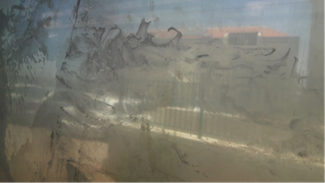
View through the windows of the armoured bus.
If I am driving to and from home, I can stop the car at the side of the road if I want. But can you stop when on the Kiryat Arba-Jerusalem road if your 3 year-old suddenly needs to pee? Three year-olds don’t always agree to relieve themselves before getting strapped into the car-seat. Secondly, while in your car you can see out the windows, can you relax and enjoy the majestic scenery where each and every rock could be one that was touched by our forefathers? Or can you only brace yourself and pray the whole way to arrive safely, each trip being a “whew, made it!” experience?
Something About Road Blocks
All the entrances to Arab towns along the way have roadblocks and soldiers on guard. Large red signs warn Israelis that it is illegal for us to enter these towns. Our own no-go zones. It is quite unpleasant to see Arab towns closed up this way, so different from the Galilee that I know so well. At the same time, it was not always like this and even now, it is not always this bad. It would not be like this at all if there were no terrorist attacks. It is too soon after the double terrorist horrors of last weekend – Hallel Ariel murdered in her home and Miki Mark murdered on the road, and all the perpetrators have not yet been apprehended.
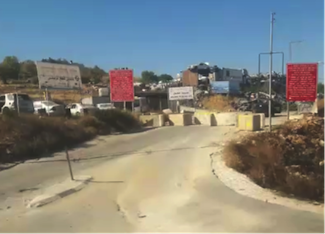
Road Block
Hearing about Arab village closures from outside the region sounds like collective punishment and it is easy to condemn. Riding along the road in person makes the same Arab village closures feel like I am being offered a safe corridor and that someone cares enough to do so, perhaps not unlike the feeling a marathon runner gets running in the space between the crowds flanking the final kilometer, showing the way “home”. By getting onto that bus, I was saying to the world, “I agree with this. I agree that Jews live here.” And that is the support that Rina asked for from citizens living outside the region.
That does not mean it is without inner conflict. I do not like my safety to be the cause of someone else’s suffering. But when that other either intends to kill my people or does nothing to stop one who intends to do so, I am prepared to live with the inner conflict.
Condolence Visit With the Family of Hallel Ariel
The hour trip went by quickly and soon the bus pulled up to my stop. Yosef was there and being greeted by him gave me confidence; we made our way through a short path to the Ariel home, together with others who got off the bus with me.
The house stands alone, surrounded by vineyards and other greenery. I did not really take it in. I was focused on the cars lining the driveway and the people who had gathered on the large porch at the entrance to the house. Rina and Amichai sat with calm dignity before those who had come to offer their condolences. Amichai was talking politics – his cousin, Minister of Agriculture and Rural Development, Uri Ariel was there, as was Nir Barkat, Mayor of Jerusalem.
Soon Rina began talking about the support they have been receiving from a local organization, Tzahi (Community Emergency Team - צח"י), that keeps track of what they and their kids need. She also mentioned her appreciation for the support of Israelis from other parts of the country who made it to the funeral.
Later, standing with a few women who had gathered around Rina inside the house, she apologized for not being able to talk with everyone. Somebody important, I think it was a representative from the American consulate, had arrived and she had just emerged from the room in which she had been talking with him privately. “We are at work during the day, my husband and I,” she said. “At night we cry.”
And there, on a table in the living room, were a number of bottles from the family vineyard, some of which had been bottled with Hallel’s help only the day before her murder. Rina asked that we remember Hallel when we bless the wine. I am not religious but I will certainly say a blessing before I drink from this bottle. It would not feel right not to.
[All photos mine, except for the photos of the Ariel family home, taken by Yosef Hartuv]
This was originally posted on Israel Diaries.
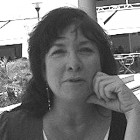
Sheri Oz, owner of www.israeldiaries.com, is a retired psychotherapist and family therapist from Haifa, Israel.

